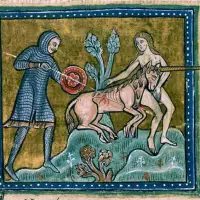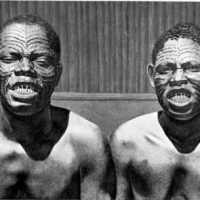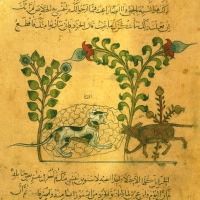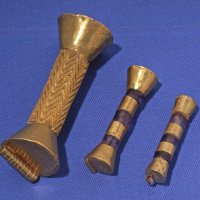Cuisine in premodern societies may contain a variety of ingredients that are meant to imbue the dish with magical attributes directed to specific ends. In past blogs on this topic we have seen dishes that are to secure love for women, love for men, successful fishing ventures, and productive garden plots.
In this entry we are given a complicated recipe for guaranteeing a successful war venture. It contains a variety of ingredients – some downright obnoxious to non-magical ways of thinking. However, remember that the goal here is to construct a magical dish – not simply a dish to eat.
The procedure is explained by the Rev. Robert Nassau in the late nineteenth century as follows:
A native of Batanga recently described to me the war-fetich as formerly prepared by his people. The medicine for it is arranged for thus.
A house is built at least several hundred yards from the village. There will be present no one but the doctor, who eats and sleeps there while he is arranging with the spirits and deciding on the medicine.
After two days he tells the people that he has finished it, that his preparations are ready, and that they must assemble at his house. He tells them to bring with them a certain shaped spear with prongs. Men have already gathered in the village, to the number of several hundred, waiting for the war. \
The doctor chooses from among them some man whom he sends to the forest to get a certain ingredient, a red amomum pod. (It contains the “Guinea grains,” or Malaguetta pepper, which taste like cardamom seeds, which a century ago were so highly valued in Europe that only the rich could buy them.)*
- This is a common misnomer; the pepper is not ‘Malaguetta’ but ‘Melegueta’; I am doing a blog about this important West African spice and several others.
Aframomum melegueta is a species in the ginger family, Zingiberaceae. This spice, commonly known as grains of paradise, Melegueta pepper, alligator pepper, Guinea grains, fom wisa, or Guinea pepper, is obtained from the ground seeds; it imparts a pungent, peppery flavour with hints of citrus. Source – Wikipedia
* From the beginning of 16th.Century copper and brass goods were shipped from the Low Countries to Portugal and from there to Guinea and inland, where Portugal merchants maintained vibrant trade networks and so-called ‘factories’ in which they settled and conducted business with uplanders. Imported pans and cauldrons were used often for salt making or, as here, to prepare magical stews. For more information see: The Exchange Economy of Pre-colonial Tropical Africa, By Lars SundströmThen the doctor and the man, leaving the crowd, go together to the forest with knife and machete and basket. They may have to go several miles in order to find a tree called “unyongo-muaele.” The doctor holds the chewed amomum seeds in his mouth, and blows them out against the tree, saying,
“Pha-a-a! The gun shots! Let them not touch me!”
The assistant holds the basket while the doctor climbs the tree and rubs off pieces of loose bark which are caught in the basket as they fall.
They then go on into the forest to find another tree named “kota.” There he blows the chewed seeds in the same way saying the same,—
“Pha-a-a! Thou tree! Let not the bullets hit me!”
And the assistant, with basket standing below, catches the bark scraped down as the doctor climbs this tree.
They return to the village and enter the doctor’s house. No women or children may enter the house or be present at the ceremonies. The men bring into the house a very big iron pot*, and the doctor says,
“This is what is to contain all the ingredients of the medicine.”

Following the demise of the Portuguese in West Africa, both the French and English stepped into the area. This picture shows a French factory on the Ogooue, to which upstream folks are coming – presumably with goods to be traded. Source – Compiegne, 1874. documents.univ.lille3.fr
Then the doctor, with two other men, takes that spear by night, leaving all the other men to occupy themselves with songs of war, while the townspeople are asleep; they go to the grave of some man who has recently died. They dig open the grave, and force off the lid of the coffin.
The doctor thrusts the spear down into the coffin into the head of the corpse. He twirls the spear about in the skull, so as to get a firm grip on it with the prongs of the spear. He changes his voice, and speaking in a hoarse guttural manner says,
“Thou corpse! Do not let any one hear what I say! And do not thou injure me for doing this to you!”
When the spear is well thrust into the skull, he stoops into the grave, and with a machete cuts off the head.
He goes away carrying the head on the spear-point. While doing all this, he wears not the slightest particle of clothing.
They go back to the village to the doctor’s house; and there they catch a cock, and in the presence of the crowd the doctor twists (not cuts) off its head.
- The blood of the cock is caught in a large fresh leaf.
- He takes the fowl to the big pot, and lets some of its blood drip into it.
- The head of the corpse is also put into the pot, with water, and
- all the other ingredients, including the spear.
- The bullets of the doctor’s gun are also to go into the pot, which is then set over a fire.
- After the water has boiled the doctor takes
- a furry skin of a bush-cat, and all the hundreds of men stand on one side in a line.
- He dips the skin into the pot, and shakes it over them. As he thus sprinkles them, he lays on them a prohibition, thus:
“All ye! this month, go ye not near your wives!”
All that month is spent by them practising war songs and dances.
- Then the doctor takes the blood that was collected on the leaf, and mixes it with powdered red-wood.
- This mixture is tied up with the human head in a flying squirrel’skin.
- He hangs this bundle up in the house over the place where he sits.
- The body of the fowl next day is torn in pieces, not cut with a knife, and placed in a small earthen pot with
- njabi oil (the oil of a large pulpy forest fruit), and
- ngândâ (gourd) seeds.
- An entire fresh plantain bunch is cut, and
- successive squads of the men peel, each man, his small piece with his finger-nails.
- These … they shred with their nails, part into the pot, and part on a plantain leaf,…
The doctor himself lifts the pot from the fire, and
- first eats of the mess, and
- then gives each of the men, with his hand, a small share.
- When all have finished eating, he opens the bundle that had been tied in the squirrel skin, and with the fibrous inner bark of a tree, kimbwa-mbenje (from which formerly was made the native bark-cloth), sponges the red rotten stuff on their breasts, saying,
“Let no bullet come here!”
- Then, led by the doctor, they march in procession to the town. There he tells the people of the town to try to shoot him, explaining that he does not wish any one to be in doubt of the efficacy of the charm. As he leads the procession, he holds the bundle in his hand, shouting,
“Budu! hah! hah! Budu! hah! hah!”
- The “hah” is uttered with a bold aspiration. This is to embolden his followers. (“Budu! hah!” does not mean anything; it is only a yell.)
- The people are terrified, though he is still shouting to them to fire at him. He is safe; for he leads the procession to where is stationed a confederate, who does fire at him point blank from a gun from which the bullets have been removed.
- It is a triumph for him! The crowd see that not only he does not fall dead, but he is not even wounded! The charm has turned aside the bullets!
- The townspeople are then invited to join the procession. They stand up with the doctor and his crowd, and dance the war-dance. When the dancing is ended, he takes the bundle and anoints all the townspeople, even the women and children.
- And the men go to their war, sure of victory. But the doctor himself does not go; he remains safely behind, saying that it is necessary for him to watch the bundle in his house.
- Defeat in the war is easily explained by saying that some one in the crowd had spoiled the charm by not obeying some item in the ritual.









![Baking Holy Bread in the Coptic Monasteries of the Eastern Desert of Egypt [qurban; 'urban]](https://i0.wp.com/dianabuja.wordpress.com/wp-content/uploads/2015/02/one-whittemore_s-expedition-before-leaving-the-monastery-of-saint-anthony-egypt-1930-19312.png?resize=200%2C200&ssl=1)

















Pingback: Missionaries in Nineteenth Century Africa – A Few Considerations | DIANABUJA'S BLOG: Africa, The Middle East, Agriculture, History and Culture
Pingback: The Magicality of Cuisine 4: A Special Dish for a Woman Cultivator, 19th Century Liberia, West Africa | DIANABUJA'S BLOG: Africa, The Middle East, Agriculture, History and Culture